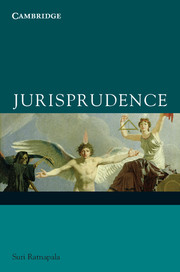Book contents
- Frontmatter
- Contents
- Acknowledgements
- List of Figures
- 1 Introduction
- PART 1 LAW AS IT IS
- PART 2 LAW AND MORALITY
- PART 3 SOCIAL DIMENSIONS OF LAW
- 7 Sociological Jurisprudence and Sociology of Law
- 8 Radical Jurisprudence: Challenges to Liberal Legal Theory
- 9 Economic Analysis of Law
- 10 Evolutionary Jurisprudence
- PART 4 RIGHTS AND JUSTICE
- References
- Index
9 - Economic Analysis of Law
from PART 3 - SOCIAL DIMENSIONS OF LAW
- Frontmatter
- Contents
- Acknowledgements
- List of Figures
- 1 Introduction
- PART 1 LAW AS IT IS
- PART 2 LAW AND MORALITY
- PART 3 SOCIAL DIMENSIONS OF LAW
- 7 Sociological Jurisprudence and Sociology of Law
- 8 Radical Jurisprudence: Challenges to Liberal Legal Theory
- 9 Economic Analysis of Law
- 10 Evolutionary Jurisprudence
- PART 4 RIGHTS AND JUSTICE
- References
- Index
Summary
What has law got to do with economics? Most lawyers will probably say ‘nothing’ or ‘not much’. However, if the question posed is ‘What has law got to do with the economy?’, most lawyers are bound to answer, ‘quite a lot’. The laws of property and contract allow people to trade in goods and services. Consumer protection laws place restrictions on how traders may conduct trade. Labour laws regulate the labour market. Competition law aims to increase competition and prevent monopolies. Tort law gives protection to person and property from wilful or negligent harm, without which trade and commerce would be seriously restricted. How can farmers grow wheat and sell their crops if their land is not secure from trespass and their crops not protected from theft? How can General Motors or Ford make and sell cars if they have no ownership of the cars that they produce? International trade and investment law promotes trade and investment among nations. There will be little foreign trade or investment if states do not recognise the rights of citizens of other states. Even laws concerned with private morality have economic effects. Prohibition of alcohol consumption in the United States gave rise to a new industry known as bootlegging. Most lawyers accept that laws affect the economy, directly or indirectly.
Lawyers also have no difficulty in recognising that economic factors have quite a lot to do with legislation passed by parliaments. Governments, depending on their philosophies, react to economic forces in different ways.
- Type
- Chapter
- Information
- Jurisprudence , pp. 242 - 266Publisher: Cambridge University PressPrint publication year: 2009



